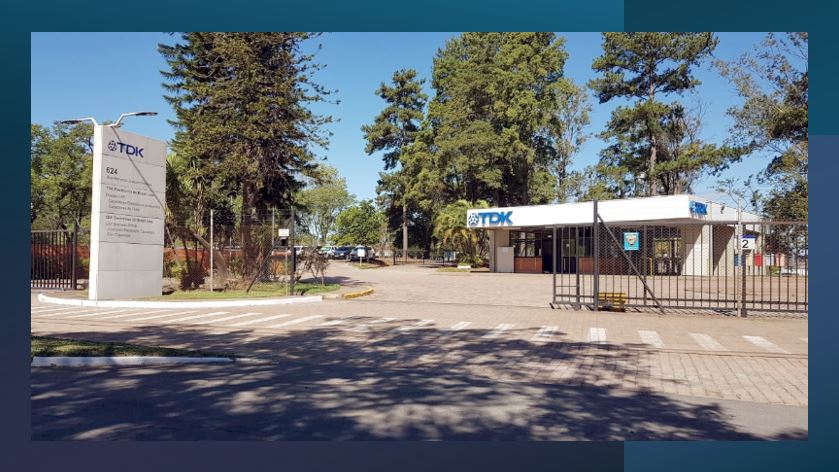Japanese multinational invests in automation and increased reliability of capacitor production at the Gravataí (SC) factory, with electronic tags and radio frequency identification incorporated into the production line

Implementing part traceability in the manufacturing process through electronic tags (ESL) and radio frequency identification (RFID) was the key for TDK, a Japanese multinational that is a world leader in electronic components, to improve the productivity of the capacitor assembly line in its only Brazilian factory, located in Gravataí (SC). At this unit, 98% of production is destined for the foreign market (mainly Asia and the USA), while around 2% supplies the Brazilian market.
TDK needed to ensure that these items, used by the automotive industries (for electric steering and electronic injection, for example) and electronics (such as white goods manufacturers), followed the correct path on the production line. The challenge was to ensure the traceability of small portions of batches of capacitors that went through a chemical bath, which aims to eliminate impregnations such as grease, oxidation and other environmental impurities from the metal body.
Although washing is essential to allow the terminals to be soldered, the next step in the assembly line, the identification of components during this step was done using paper labels surrounded by a type of plastic envelope. In addition to not being able to withstand the chemical bath for a long time and not ensuring the clarity of the recorded information, the printed tags did not prevent sublot data from being lost in this process.
The way capacitors need to be moved through the assembly line made this challenge even more complex. Throughout this process, the components are transported inside nylon baskets – which, in turn, are placed in plastic boxes, as part of the Kanban method adopted by the TDK unit. It was necessary to eliminate the risk of incorrect association between the two containers, as the basket becomes detached from the box before being washed and then returned to the original container.
A mixed combination between baskets and boxes would affect the quality and confidence in the traceability of the parts, as it would no longer guarantee that the components had passed through all stages of the assembly line.
With traceability and no errors
To optimize this structure, TDK concluded that a new solution needed to be more robust and innovative. In partnership with Seal Sistemas, one of the largest integrators of advanced technologies for the supply chain in Brazil, the Japanese multinational carried out the combined implementation of ESL labels on plastic boxes and RFID tags on nylon baskets - both supported by data via radio frequency and automatically updated by Kairos Warehouse, software from the Brazilian company.
With the architecture and implementation of the project led by Seal Sistemas, 2,000 electronic tags were installed and, initially, 800 RFID tags – the idea is that this quantity will also reach 2,000. Three Wi-Fi antennas were also implemented throughout the factory warehouse and 15 RFID readers attached to each machine.
Adopted between December 2022 and January 2023, this technological structure reduced errors recorded in the capacitor line by 100%. “The solution represented an advance towards industry 4.0 by ensuring the traceability of capacitors that circulate on the assembly line. In addition to ensuring assertiveness and integration in the data displayed at the same time on ESLs and RFID tags, the technology also increased reliability in the production process”, says Candido Dallagnol, commercial and technology manager at TDK.
Today incorporated into the assembly line, the solution guarantees the correct association between the baskets containing washed capacitors and the corresponding boxes. Another benefit was the visual quality of the displays, which make details about the portion of the batch involved in each stage of the process clearer to factory employees. Eliminating the risk of changes to label data also eliminated the need for intermediate identification, speeding up the process as a whole.
Industry 4.0
Once the capacitor assembly cycle is complete, the ESL and RFID tags are detached from the respective containers, making them available again at the start of the production line. Due to the automation of tag reading, employees only need to reposition the boxes at the beginning of the line for a new series of components.
According to Dallagnol, the agility in implementation, which took just two weeks, gave the unit's managers more time to test the technology, helping the project run with greater quality and speed from the beginning to the end of the cycle.
“The project at TDK highlights the innovative capabilities of our portfolio of services and technologies, which includes traceability even under challenging conditions. We continue to work very hard to integrate cutting-edge solutions and bring to Brazil the most advanced digitalization of the factory floor, already incorporating the best practices of industry 4.0”, says Wagner Bernardes, CEO of Seal Sistemas.
In the future, TDK intends to expand the implementation of ESL and RFID tags to other stages of production at the Gravataí factory. Plans are also to internationalize the project, with a possible expansion to a unit in Germany.
“The wide applicability of ESL and RFID expands access to these advanced solutions for players of different sizes and segments of the national industry, such as TDK's Brazilian unit. Whether to improve the traceability of components and equipment in the manufacturing environment, optimize price management in retail or automate the operational routine of logistics warehouses, these technologies are more available than ever for any business interested in driving digital transformation”, says Ruy Castro, vice president of regional sales at Seal Sistemas.












